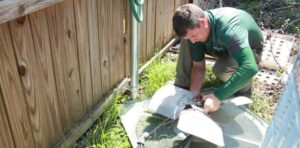Having an HVAC system that is running at its full capacity is an obvious plus for the average homeowner. While it is not necessary for a homeowner to know all the ins and outs of their HVAC system it can be helpful if they are able to do simple inspections in avoidance of home visits over minor issues. In the end, knowing how to check your AC system can save you valuable time and money. Here are some of the things to check prior to calling for an AC repair home visit:
 Air Filter
Air Filter
A dirty filter will keep an HVAC system from performing properly. Also, the lack of air that is able to flow through the system will also negatively affect your utility bill. In an effort to lower your utility bill and keep from needing premature AC repair make sure to regularly replace your filters.
Thermostat
We commonly receive calls that could be handled by checking the thermostat. If all other options have been exhausted, make sure to check the thermostat hasn’t simply been switched to the opposite function desired. Often this can be overlooked, especially in homes with a multitude of people living under the same roof. Be sure someone didn’t accidentally change the setting from air conditioning to heating or vice versa.
Ice and Obstructions
When an AC unit begins building up ice, turn it off immediately. Then, search for anything that could be blocking the supply vents and filters. Clear the obstructions and test the system to see if it begins working properly again. If there were no obstructions, be sure to call a technician for AC repair and leave the system off in the meantime.
Power Supply
Some HVAC systems have a switch located near the unit that looks similar to a light switch that can be easily flipped off. Simply checking it when your home drastically changes temperatures can be a time and money saver. If that isn’t the issue, it could also be an issue with the circuit breaker. If a unit is located outside there may be a separate fuse for the disconnect switch. Always make sure to check the power sources because you may need to schedule a different kind of technician depending on what the issue is.
Pilot Light and Flash Codes
If the pilot light goes out for an older gas furnace the entire system will stop working. If you own one of these systems, make sure to check if the pilot light is still lit. Newer systems are thankfully a little more advanced and come with flash codes to help determine where the issue is. Be mindful of the fact that seeing a flash code doesn’t necessarily mean that there is a problem. The furnace panel will have the explanations of each code. Call a professional AC repair technician if the code explanation says anything about an operational issue.
Doing a few simple checks could save some time, but if issues are still occurring, don’t hesitate to call Comfort Experts for AC repair. That’s what we are here for.
